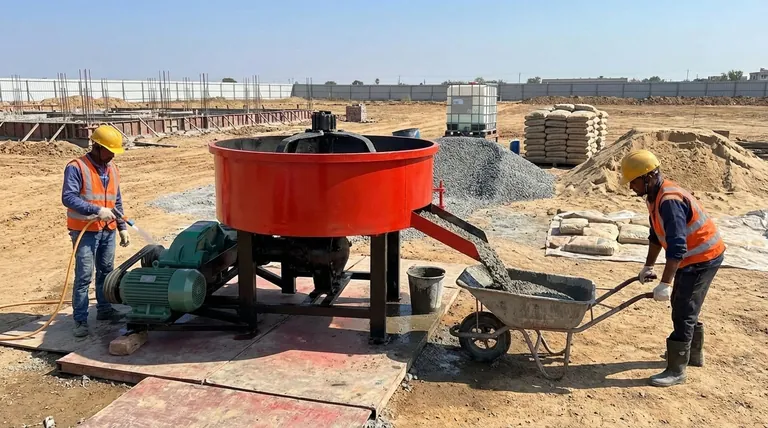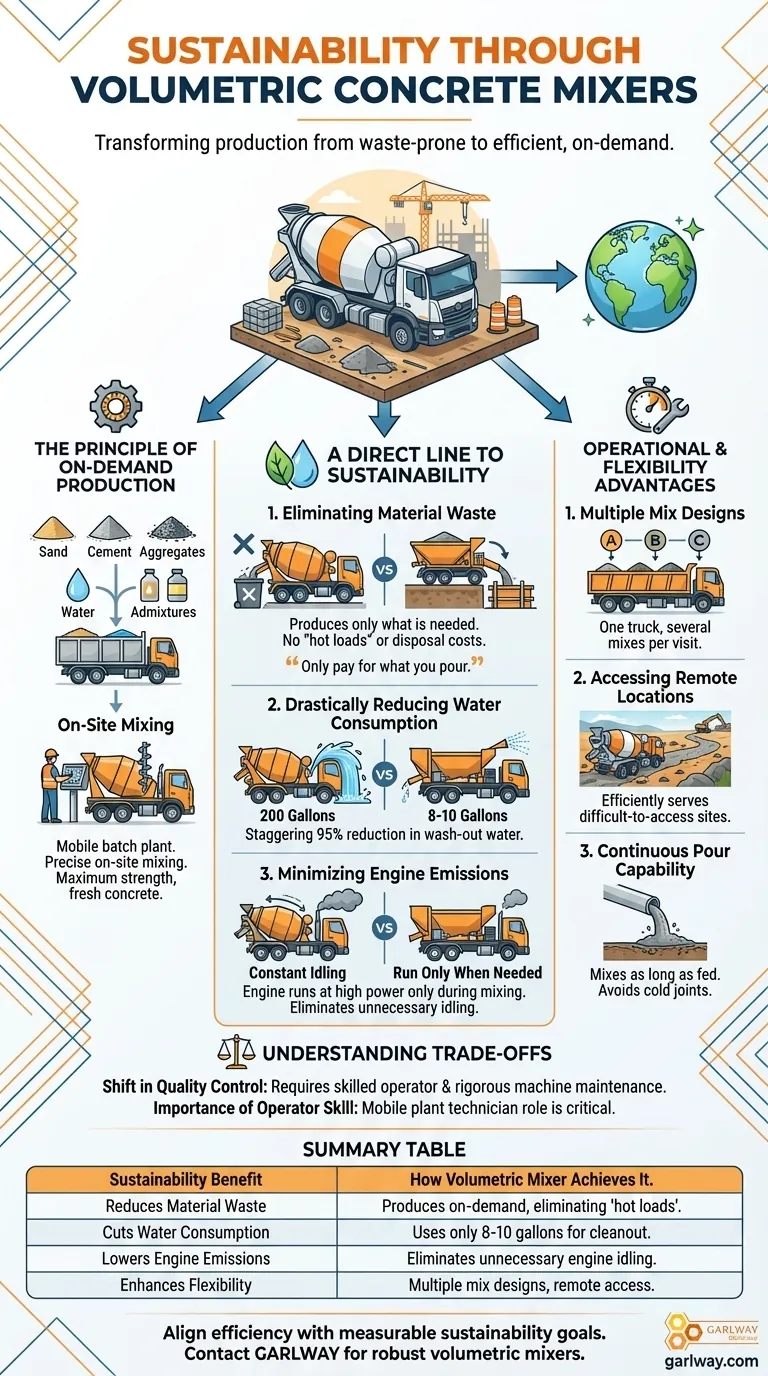From an operational standpoint, volumetric concrete mixers enhance sustainability by fundamentally changing where and when concrete is produced. They function as mobile batch plants that mix precise quantities on-site, a process that directly reduces material waste, significantly cuts water consumption during cleanup, and lowers emissions by eliminating the engine idling common with traditional methods.
A volumetric mixer's sustainability isn't just a feature; it's a direct result of its core function. By shifting the entire batching process from a central plant to the job site, it transforms waste-prone logistics into an efficient, on-demand production model.

The Principle of On-Demand Production
What is a Volumetric Mixer?
A volumetric mixer is best understood as a self-contained, mobile concrete batch plant. It carries raw materials—sand, cement, aggregates, water, and admixtures—in separate compartments on a single truck chassis.
Unlike a traditional barrel truck that transports pre-mixed, perishable concrete, a volumetric mixer combines these ingredients at the job site.
How On-Site Mixing Works
Upon arrival, a trained operator inputs the required mix design and quantity. The machine then measures, mixes, and dispenses the exact amount of fresh concrete needed for the pour.
This on-demand process ensures that the concrete is at its maximum strength and workability, as it hasn't been agitated for an extended period during transit. The result is often a stronger, more durable final product.
A Direct Line to Sustainability
The environmental benefits of volumetric mixing are not accidental; they are inherent to the on-site production model.
Eliminating Material Waste
The most significant contribution is the near-elimination of wasted concrete. You produce only what you need, down to the last cubic foot.
This avoids the common problem of "hot loads"—unused concrete in a barrel truck that has to be discarded—and removes the cost and environmental burden of waste disposal.
Drastically Reducing Water Consumption
Cleaning a traditional barrel mixer is a water-intensive process, often requiring up to 200 gallons to wash out the drum.
A volumetric mixer, by contrast, requires only 8-10 gallons of water for its cleanout procedure. This is a staggering reduction in water usage on any project.
Minimizing Engine Emissions
Traditional ready-mix trucks must keep their drums rotating constantly, which means the engine is always running, even while waiting on-site.
A volumetric mixer's engine only needs to run at high power during the mixing and pouring process. It can be shut down before and after the pour, eliminating hours of unnecessary idling and the associated emissions.
Understanding the Trade-offs
While highly efficient, the volumetric model introduces different operational considerations compared to a central batch plant.
Shift in Quality Control
With a traditional mixer, quality control is centralized at the batch plant. With a volumetric mixer, the responsibility for an accurate mix shifts to the on-site operator and the machine's calibration.
This requires rigorous machine maintenance and highly skilled operators to ensure consistency and adherence to mix design specifications.
The Importance of Operator Skill
The operator of a volumetric mixer is more than a driver; they are a mobile plant technician. Proper training is critical to manage different mix designs, adjust for site conditions, and ensure the equipment is functioning correctly.
Beyond Sustainability: Added Flexibility
The on-demand model provides operational advantages that extend past environmental benefits.
Multiple Mix Designs from One Truck
A single volumetric truck can produce several different concrete mix designs during one site visit. This is impossible for a traditional truck, which can only carry one pre-determined mix.
Accessing Remote Locations
These mixers can reach remote or difficult-to-access job sites where a traditional ready-mix plant may not be able to deliver efficiently.
Continuous Pour Capability
For projects requiring a continuous pour, a volumetric mixer can mix for as long as it is fed with raw materials, eliminating the logistical challenges and potential cold joints caused by waiting for multiple barrel trucks to arrive.
Making the Right Choice for Your Project
To determine if this technology is right for you, consider your primary project driver.
- If your primary focus is minimizing environmental impact: A volumetric mixer is the superior choice due to its inherent reduction in material waste, water use, and emissions.
- If your primary focus is cost control on variable-pour jobs: The ability to pour exact quantities eliminates the cost of over-ordering and waste disposal, making it highly economical.
- If your primary focus is logistical flexibility: A volumetric mixer's capacity to deliver multiple mix designs and serve remote sites provides a significant advantage over traditional methods.
Ultimately, adopting volumetric mixing is a strategic decision to align operational efficiency with measurable sustainability goals.
Summary Table:
| Sustainability Benefit | How a Volumetric Mixer Achieves It |
|---|---|
| Reduces Material Waste | Produces concrete on-demand, eliminating 'hot loads' and disposal of unused material. |
| Cuts Water Consumption | Uses only 8-10 gallons for cleanout vs. 200+ gallons for a traditional barrel mixer. |
| Lowers Engine Emissions | Eliminates hours of engine idling required to keep a traditional drum rotating. |
| Enhances Flexibility | One truck can deliver multiple mix designs and serve remote locations efficiently. |
Ready to align your project's efficiency with measurable sustainability goals?
GARLWAY specializes in providing robust construction machinery, including advanced volumetric concrete mixers, for construction companies and contractors globally. Our equipment is engineered to help you reduce operational costs, minimize environmental impact, and gain unparalleled on-site flexibility.
Contact GARLWAY today to discuss how our concrete batching plants, mixers, and winches can deliver superior performance and sustainability for your next project.
Visual Guide

Related Products
- Construction Products Concrete Plant Machine Mixing Concrete Mixer
- JDC350 Small Cement Concrete Mortar Mixer
- HZS90 Large Multiquip Concrete Mixers for Construction
- JS1000 Volumetric Concrete Mortar Mixer for Sale Skid Steer Cement Mixer
- JZC500 Large Cement Mixer Machine Price for Concrete Mix
People Also Ask
- What factors affect the production capacity of a concrete mixing plant? Unlock Your Plant's True Potential
- What are the general advantages of a cement mortar mixing plant? Achieve High Efficiency & Superior Quality
- What is the role of the control system in a concrete batching plant? Ensure Precision & Maximize Efficiency
- What components are included in the material weighing system of a concrete mixing plant? A Guide to Precision Batching
- What factors should be considered when designing the foundation for a powder storage tank? Ensure Stability and Safety
- How does the material conveying system work in a concrete batch plant? A Guide to Efficient Material Handling
- How to determine the size of a concrete batching plant based on construction requirements? Optimize Your Project's Concrete Supply
- What are the daily maintenance tasks for the screw conveyor in a concrete mixing plant? Prevent Costly Downtime



















